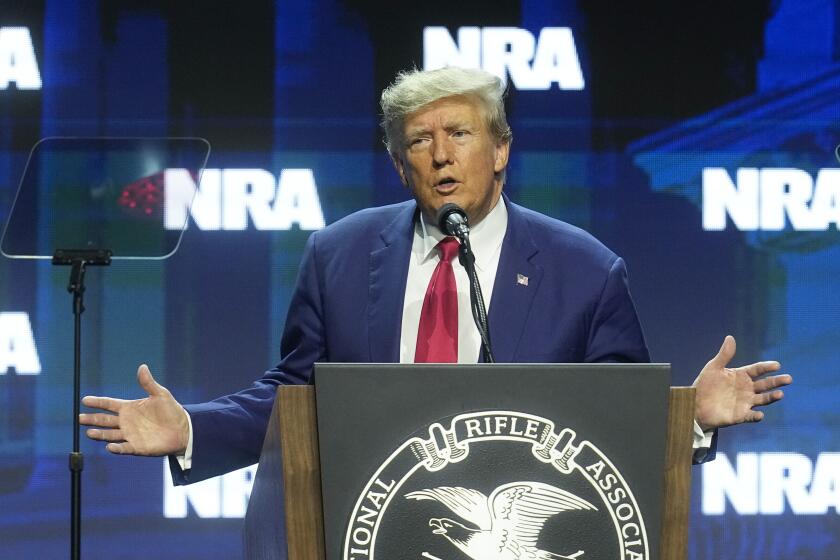David Lowery’s uphill fight against commodification
David Lowery has a modest proposal to help his fellow musicians in the digital age: force Pandora and other online music services to negotiate for the right to play songs.
Lowery — leader of indie-rock pioneers Camper Van Beethoven and later, the harder-rocking Cracker — has emerged as a vocal advocate for artists trying to make a living in music while CD sales crumble and fledgling online services try to build an audience. While some independent artists have rallied behind the new distribution and promotional opportunities on the Internet — e.g., electronic musician Derek Vincent Smith (a.k.a. Pretty Lights), who offers free downloads of his music, or rap titan Public Enemy, which is distributing a free single and remixable tracks via BitTorrent — Lowery has pushed back hard against what he calls the “exploitation economy” online.
His particular bugaboos: advertiser-supported piracy, the culture of free content and streaming services that pay a fraction of a penny per song played. In some circles, that makes Lowery a reality-denying crank caught on the wrong side of history. (For the record, I often run in those circles.) But he’s more like an entrepreneur trying to take his goods to market on his own terms, and he’s frustrated by the many forces aligned to prevent that from happening.
And he’s not anti-Internet. He’s anti-One-Size-Fits-Allnet.
“Absolutely, disintermediation has been a really fantastic creative thing for artists,” he said in a recent interview. “Our artists are definitely liberated creatively. If I want to do an acoustic version of one of my songs with Kevn Kinney ... and put it out on YouTube or whatever, there’s no gatekeeper over what we’re doing creatively, really, any more.”
The challenge is translating that freedom and opportunity into dollars. It’s never been easy to make a living in music, a hits-driven business in which the vast majority of acts sell only as many copies of their recordings as they have relatives. The Internet makes it far easier than before to put one’s music in front of people who might actually like it, and so build relationships and an audience. But with no barriers to entry and so many acts competing for attention, it may be even harder than it used to be to stand out from the crowd.
The conventional wisdom is that artists will use the new tools to become more efficient and effective at touring. Lowery — who’s on a 30th-anniversary tour with Camper Van Beethoven, which included a stop Saturday at the Troubadour in West Hollywood — counters that it’s not so easy to thrive on the road, either.
“I think the vast majority of artists don’t actually make any money” on tour, he said. He just returned from a two-week swing through Europe with Camper Van, playing for 125 to 250 people a night. “We came home and we had about 200 euros each.... The idea was, we’re going to sell some albums.”
In the indie-rock scene, only the top 3% to 4% of the acts can count on drawing a steady 200 people a night, Lowery said. If it’s a band with four members, it would have to play about 200 of those shows a year “to make about the same as a schoolteacher.”
And touring does nothing for songwriters who aren’t performers. They make their money on royalties when their songs are recorded or publicly performed (whether it be in a radio broadcast, a webcast or a cover band playing in a bar). Performing artists also receive a royalty when one of their recordings is streamed online, although not when a radio station plays it over the air.
Collectively, those streams are generating a lot of money for songwriters, performers and labels. But for individuals, the numbers may not be so impressive. Last month Lowery posted the last quarterly royalty statement he received for “Low,” a hit song he co-wrote for Cracker. While over-the air stations paid him $1,522 in royalties, Pandora, the biggest online webcaster, paid him $16.89.
ASCAP and other royalty-collection societies for songwriters offer licenses to all the songs in their libraries in exchange for a percentage of the broadcaster or webcaster’s revenue. So webcasters, who tend to have a disproportionate ratio of listeners to revenue, pay much less per spin than the average broadcasters.
One problem for artists, Lowery argues, is that the system treats songs as commodities. That’s caused by a variety of forces, including music services trying to amass comprehensive libraries with millions of songs, compulsory licenses that set standard fees per recording webcast, and collections societies that deal in blanket licenses covering enormous swaths of the songwriting world. Yet it rankles Lowery, who wants to remove compulsory and blanket licenses, forcing online services to negotiate for more of the rights they now obtain automatically.
Doing so would create a pretty sizable barrier to entry for would-be music services. But Lowery argues that it would also create new opportunities for services to specialize, targeting specific markets with their own interests and enthusiasms.
“The people who like Camper Van consume it very differently from the people who want a Justin Bieber song, or those two huge Macklemore & Ryan Lewis hits,” he said. “I’m not saying I know what the price is for my songs, but I would like to have a real market for these songs.... Every song has the same commoditized value, every artist — that’s fundamentally anti-market. Are we trying to create the sort of Maoist, flat, socialist-like sharing economy here, and is that ultimately holding back the Web as an economy?”
Different services have their own audiences and unique tools for promoting artists, which means they serve some bands better than others, Lowery said. Had Pandora been around when “Low” became a hit, the royalties for the song might have been substantial. And Pandora’s ability to introduce people to unfamiliar bands whose music fits their tastes could help a lesser-known band like Camper Van, he said.
On the other hand, streaming services just can’t generate a meaningful amount of revenue for more obscure indie acts, Lowery asserted. “Pandora will never work for more specialty niche bands like Camper Van,” he said, adding that even paid subscription services won’t be much help unless every household signs up for them.
And yet Pandora does write big royalty checks. Founder Tim Westergren revealed last October that Pandora expected more than 2,000 artists to generate more than $10,000 in royalties each over the subsequent 12 months, and 800 of those would generate more than $50,000 each.
The drawback for many artists is that they have to split those checks — with not just their bandmates but also their labels. Performers collect about half the royalties paid by webcasters such as Pandora. For on-demand streams, however, their share can be considerably smaller, depending on the terms of their record contract.
At least webcasters and subscription services are paying artists something. There’s no shortage of unlicensed sites online that pay no royalties on the music they distribute. Artists can demand that sites take the material down, but Lowery said they can’t keep pace with the burgeoning amount of piracy. Such sites typically are supported by advertising, and Lowery has been trying to shame the companies whose ads appear on piracy hotbeds into paying more attention to where their dollars are going.
Lowery’s complaints all seem to boil down to lamentations about the scale and automation of the Web, along with the technology-fueled shift toward unlimited consumption and unlimited inventory. Unlike pay-TV, the music business wasn’t built to sell access to bundles of entertainment. It was built to let individual artists (and their labels) extract cash from fans of their specific works. So when consumers switch from paying $15 for one artist’s CD to paying $0 to $10 for access to all recorded music for a month, the artist’s revenue stream gets massively diluted.
Some acts are going to great lengths not to be treated like commodities in the digital music world. Examples include holding their music off all licensed services, or striking a deal with one service to give them tracks exclusively in exchange for higher royalties. But for most artists, the compulsory licenses in the law, the deals they’ve signed with labels and the blanket licenses sold by collections societies give them little power to set terms.
House Judiciary Committee Chairman Robert W. Goodlatte (R-Va.) has said he wants to explore a comprehensive update of copyright laws to reflect the changes wrought by broadband. He should invite Lowery to offer the perspective of an artist who wants to put the free market to work, if only the system will give him the chance.
ALSO:
Who’s to blame for Detroit’s collapse?
Dzhokhar Tsarnaev and his disgusting fangirls
It’s Anthem Blue Cross’ turn to turn on Obamacare
Follow Jon Healey on Twitter @jcahealey
More to Read
A cure for the common opinion
Get thought-provoking perspectives with our weekly newsletter.
You may occasionally receive promotional content from the Los Angeles Times.











